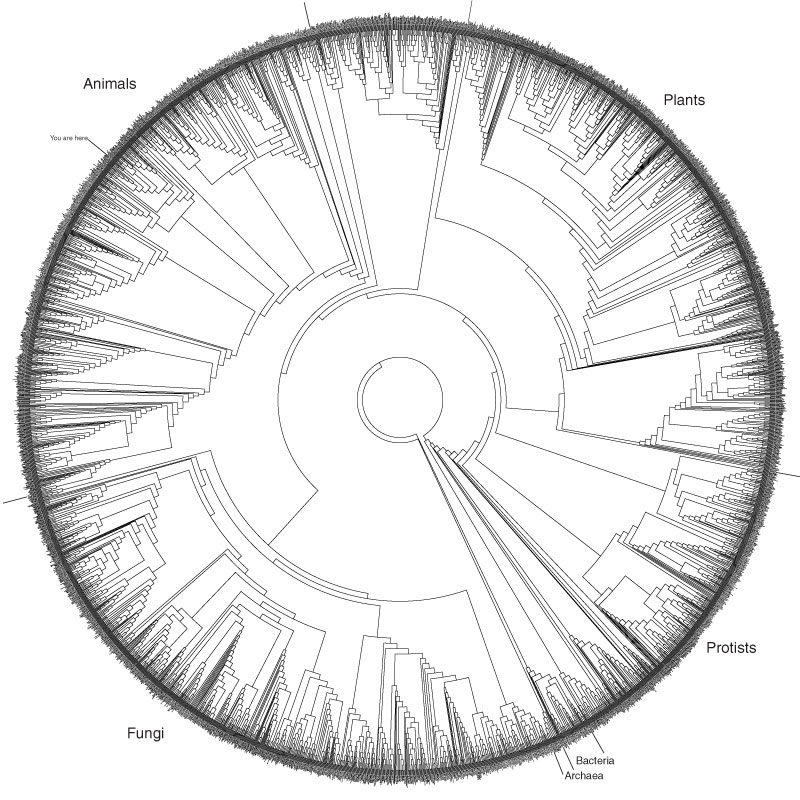February 27, 2024 • #
There’s a common misconception that evolution is “seeking” fitness — that there’s some inherent motivation in the process pushing toward a particular objective.
But evolution is an undirected process of mutation, testing, and accidental discovery of fitness. Within the genes of an organism, there is no memory acquiring feedback from these experimental genetic guesses. Genetic drift, mutation, and natural selection are evolution’s conjecture and criticism. But the criticism feedback loop doesn’t close in a single generation.
Evolution’s feedback loop is survival. If a gene survives, it will replicate. If it doesn’t, that mutation is “found” not to have worked (though...
✦
February 20, 2024 • #
We learn about “The Enlightenment” as a singular entity, a historical age associated with rationality, scientific inquiry, humanism, and liberty. The Enlightenment and scientific revolution were defining moments that spawned an unprecedented period of progress and human flourishing. But in his book The Beginning of Infinity, David Deutsch adds useful texture for better understanding the motivations of the Enlightenment’s contributors.
He divides the movement into two broad forms: the “British” and the “Continental”.
Both branches agree on the core principles of rationality, progress, and freedom. Where they disagree is on how to achieve these goals. They pursue the same ends,...
✦
October 26, 2023 • #
Jason Fried recently wrote that we should teach iteration as a subject, or technique at least, in schools.
Another subject wildly undertaught is evolution. Not just the “creation vs. evolution” Big Picture story of how humans got here that we’ve spent centuries arguing over. I mean the underlying mechanisms of random variation, error correction, and fitness-to-environment testing that creates emergent order:
Out of the random variation, which is the result of mutations/copying-errors (which can be the result of exposure to radiation, metals or chemical substances), only a small percentage actually increases the fitness of an individual. Those mutations tend...
✦
September 9, 2021 • #
New forms of technology tend not to materialize from thin air. The nature of innovation takes existing known technologies and remixes, extends, and co-opts them to create novelty.
Gordon Brander refers to it in this piece as “exapting infrastructure.” As in the case of the internet, it wasn’t nonexistent one day then suddenly connecting all of our computers the next. It wasn’t purposely designed from the beginning as a way for us to connect our millions of computers, phones, and smart TVs. In fact, many types of...
✦
August 15, 2020 • #
Biologist Stuart Kauffman on biological functions and the “adjacent possible”:
The unexpected uses of features of organisms, or technologies, are precisely what happens in the evolution of the biosphere and econosphere, and the analog happens in cultural evolution with the uses of mores, cultural forms, regulations, traditions, in novel ways. In general, these possibles are novel functionalities, in an unbounded space of functionalities, and so are not mathematizable and derivable from...
✦
November 16, 2019 • #
Turns out cultures from warmer climates evolved a taste for spicy foods to combat the presence of more diverse bacteria:
Alas, nothing in nature turns out to be that simple. Researchers now suggest that a taste for spices served a vital evolutionary purpose: keeping our ancestors alive. Spices, it turns out, can kill poisonous bacteria and fungi that may contaminate our food. In other words, developing a taste for these spices could be good for our health. And since food spoils more quickly in hotter weather, it’s only natural that warmer climates...
✦
November 23, 2018 • #
In going through the backlog of Sam Harris’s Waking Up podcast, I put on this not-too-recent episode with Bret Weinstein, evolutionary biologist, free thinker, and polymath that I’ve heard in a number of other interviews before. This one in particular was fascinating since it went fairly deep on his area of expertise in biology, evolution, adaptation, and genetics.
Weinstein talks about human advancement through the lens of what is and isn’t a biological adaptation. I love the idea that the reason humans have progressed to such an advanced state is the shift in adaptation from the...
✦
